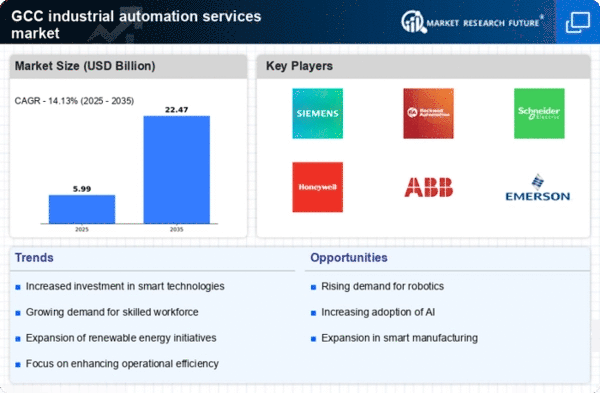Integration of Advanced Robotics
The integration of advanced robotics into manufacturing processes is significantly influencing the industrial automation-services market. Robotics technology is evolving rapidly, with capabilities that enhance precision, speed, and flexibility in production lines. In the GCC, industries such as oil and gas, manufacturing, and logistics are increasingly adopting robotic solutions to improve their operational capabilities. Reports indicate that the use of robotics can lead to a reduction in labor costs by up to 30%, thereby making a compelling case for investment in automation services. This trend suggests a robust growth trajectory for the industrial automation-services market as companies seek to leverage robotics for competitive advantage.
Increased Adoption of IoT Solutions
The adoption of Internet of Things (IoT) solutions is transforming the industrial automation-services market in the GCC. IoT technologies enable real-time data collection and analysis, facilitating smarter decision-making processes. Industries are leveraging IoT to monitor equipment performance, predict maintenance needs, and optimize supply chain operations. This trend is evidenced by a reported increase in IoT investments, which are projected to reach $10 billion in the region by 2026. The integration of IoT into automation services is expected to enhance operational visibility and efficiency, thereby driving growth in the industrial automation-services market.
Focus on Workforce Skill Development
As the industrial automation-services market expands, there is a growing focus on workforce skill development in the GCC. The introduction of sophisticated automation technologies necessitates a workforce that is equipped with the necessary skills to operate and maintain these systems. Companies are investing in training programs to upskill their employees, ensuring they can effectively engage with new technologies. This emphasis on skill development is crucial, as it not only enhances productivity but also fosters innovation within organizations. The potential for a skilled workforce to drive automation adoption is likely to have a positive impact on the industrial automation-services market.
Rising Demand for Operational Efficiency
The industrial automation-services market is experiencing a notable surge in demand for operational efficiency across various sectors in the GCC. Companies are increasingly seeking to optimize their processes to reduce costs and enhance productivity. This trend is driven by the need to remain competitive in a rapidly evolving market landscape. According to recent data, organizations that have implemented automation solutions report an average increase of 20% in operational efficiency. This growing emphasis on efficiency is likely to propel the industrial automation-services market forward, as businesses invest in advanced technologies to streamline their operations and minimize waste.
Government Initiatives Supporting Automation
Government initiatives aimed at promoting automation are playing a pivotal role in shaping the industrial automation-services market in the GCC. Various national strategies are being implemented to encourage the adoption of advanced technologies across industries. These initiatives often include financial incentives, regulatory frameworks, and support for research and development. For instance, the GCC governments are investing heavily in smart city projects, which inherently rely on automation technologies. Such support is likely to stimulate growth in the industrial automation-services market, as businesses are encouraged to adopt innovative solutions to align with national objectives.

















